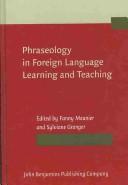| Listing 1 - 6 of 6 |
Sort by
|

ISBN: 9789027232670 9789027232441 902723244X 9786612151996 1282151991 9027291314 9027232679 9789027291318 9781282151994 Year: 2008 Publisher: Amsterdam Benjamins
Abstract | Keywords | Export | Availability | Bookmark
 Loading...
Loading...Choose an application
- Reference Manager
- EndNote
- RefWorks (Direct export to RefWorks)
This book addresses the key role of phraseology in second language acquisition and instruction. It is divided into three main sections: Extracting and Describing Phraseological Units investigates the role played by native and learner corpora in the extraction and description of multiword units, two initial and crucial steps in informing language pedagogy; Learning Phraseological Units deals with the learning aspect, an oft-neglected yet essential dimension of phraseology in second/foreign language pedagogy, this section also addresses issues in new literacies; and Recording and Exploiting Phraseological Units focuses on pedagogical tools, notably monolingual and bilingual dictionaries and textbooks. This stimulating collection presents cutting edge research in the field and identifies major avenues for future theoretical and applied work. It is of particular relevance to researchers and teachers interested in the patterned nature of language.
--Phraséologie --- --Study and teaching. --- #KVHA:Fraseologie --- 802.0-07 Engels: taalonderwijs; taalverwerving --- Engels: taalonderwijs; taalverwerving --- #KVHA:Taalonderwijs --- 800 --- 37 --- 800.7 --- 802.0-07 --- 801.3 --- 801.3 Lexicografie. Woordenboeken --- Lexicografie. Woordenboeken --- 800.7 Taalonderwijs. Taalverwerving --- Taalonderwijs. Taalverwerving --- 800 Taalwetenschap. Taalkunde. Linguistiek --- Taalwetenschap. Taalkunde. Linguistiek --- 37 Opvoeding en onderwijs --(algemeen) --- Opvoeding en onderwijs --(algemeen) --- Language and languages --- Phraseology --- Fraseologie --- Taal en talen --- Study and teaching. --- didactiek. --- Grammar, Comparative and general --- Semantics --- Terms and phrases --- Foreign language study --- Language and education --- Language schools --- Study and teaching --- Phrases --- Syntax --- Lexicology. Semantics --- Didactics of languages --- Langues --- --Enseignement --- 37 Education --- Education --- Language and languages Study and teaching --- Language and languages - Study and teaching. --- Phraseology - Study and teaching. --- Enseignement --- Phraséologie
Book
ISBN: 9789027232465 9027232466 Year: 2008 Publisher: Amsterdam Benjamins
Abstract | Keywords | Export | Availability | Bookmark
 Loading...
Loading...Choose an application
- Reference Manager
- EndNote
- RefWorks (Direct export to RefWorks)
Lexicology. Semantics --- Phraseology --- Phraseology. --- Fraseologie. --- 801.3 --- 801.3 Lexicografie. Woordenboeken --- Lexicografie. Woordenboeken --- Grammar, Comparative and general --- Language and languages --- Semantics --- Terms and phrases --- Phrases --- Syntax --- Phraséologie --- Didactics of languages
Book
Year: 2008 Publisher: Amsterdam/Philadelphia John Benjamins Publishing Company
Abstract | Keywords | Export | Availability | Bookmark
 Loading...
Loading...Choose an application
- Reference Manager
- EndNote
- RefWorks (Direct export to RefWorks)
Digital
ISBN: 9789027232465 Year: 2008 Publisher: Philadelphia John Benjamins Pub
Abstract | Keywords | Export | Availability | Bookmark
 Loading...
Loading...Choose an application
- Reference Manager
- EndNote
- RefWorks (Direct export to RefWorks)
Book
ISBN: 1282105523 9786612105524 9027290113 9789027290113 9781282105522 9789027232465 9027232466 6612105526 Year: 2008 Publisher: Amsterdam Philadelphia John Benjamins Pub.
Abstract | Keywords | Export | Availability | Bookmark
 Loading...
Loading...Choose an application
- Reference Manager
- EndNote
- RefWorks (Direct export to RefWorks)
Phraseology. --- Grammar, Comparative and general --- Syntax.
Dissertation
Year: 2008 Publisher: Louvain-la-Neuve: UCL,
Abstract | Keywords | Export | Availability | Bookmark
 Loading...
Loading...Choose an application
- Reference Manager
- EndNote
- RefWorks (Direct export to RefWorks)
This dissertation investigates an area of notorious difficulty for learners of English as a Foreign Language (EFL) within the framework of Cognitive Linguistics. Research from previous studies has indicated that phrasal verb learning may be more effective if a Cognitive Linguistic approach is adopted. However, the quantitative and qualitative research in this dissertation demonstrates that the approach, once integrated into a regular, classroom-based EFL programme, does not consistently yield significant learning gains. Further qualitative investigations highlighted the fact that the benefits of the approach have less to do with the Cognitive Linguistic explanations than with their compatibility with other learning strategies, such as employing imagery and grouping information. In addition, the approach is most suited to phrasal verbs that are already partially familiar to students. However, for other phrasal verbs the Cognitive Linguistic approach may even impede learning. In addition, the implications for phrasal verb pedagogy are then presented and discussed.
| Listing 1 - 6 of 6 |
Sort by
|

 Search
Search Feedback
Feedback About UniCat
About UniCat  Help
Help News
News